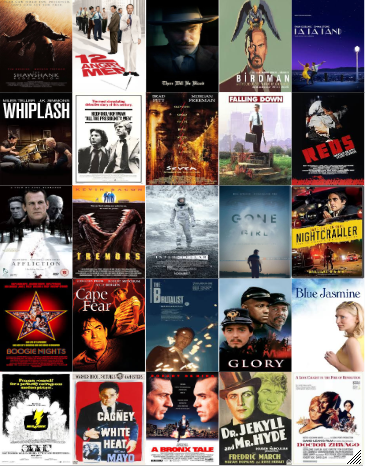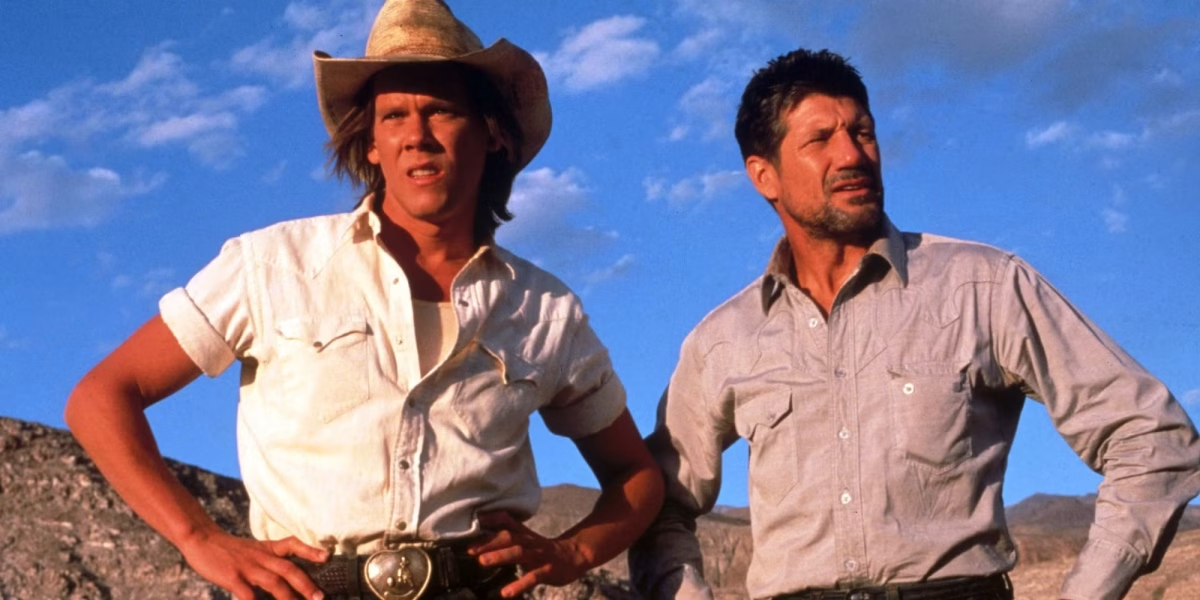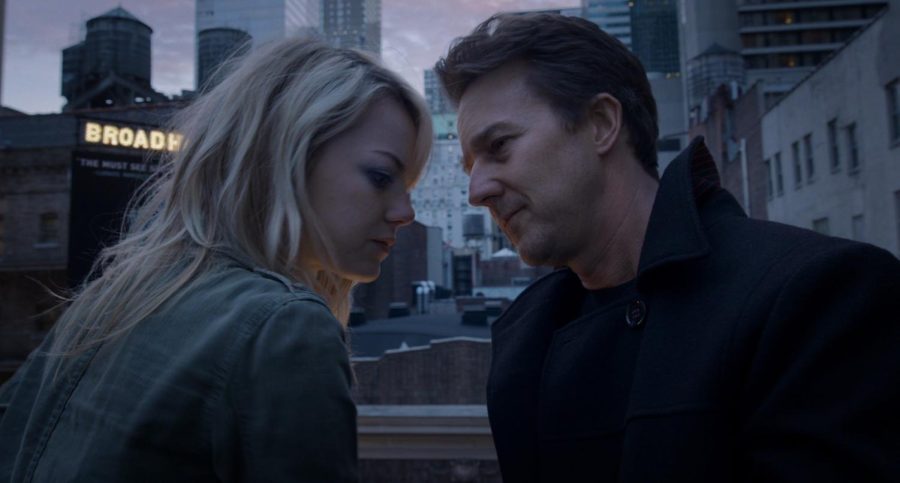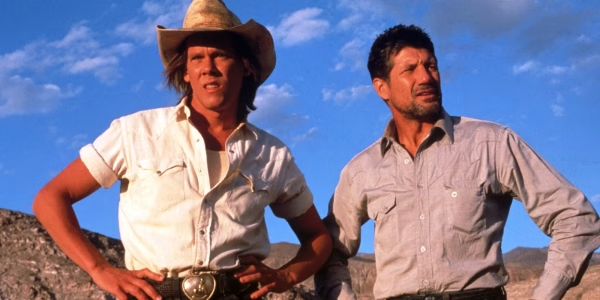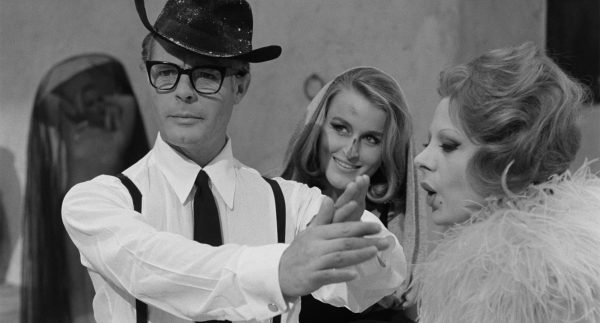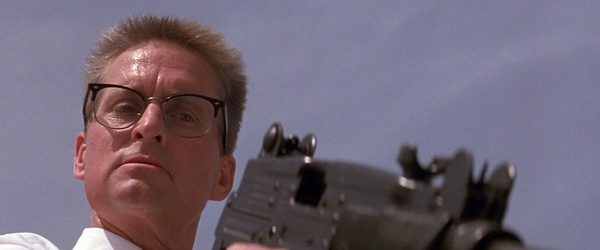The Unexpected Virtue of a Crazy Idea: Part 3
Mike and Sam on the roof top
This is Part Three of my review of the film Birdman: or The Unexpected Virtue of Ignorance.
For this section, we’re unfortunately going to stick with the topic of self-loathing but as it applies to a different character, Mike Shiner. Self-loathing seems to be a constant theme in Birdman and is found within several characters.
Mike Shiner is an interesting read. He is so much like the person who plays him, he could almost be considered a caricature.
Mike Shiner is a very talented actor and he wants everyone to know it. He lives and breathes the theater, so much to the point where he regards his life outside of it to be a sham. To reinforce this sentiment he states, ¨I don’t pretend. Not out there. Just about every place else, but never out there.¨
The whole reason Mike is brought on board in the first place is to try to use his popularity and reputation as an actor to drum up ticket sales. Even so, he wasn’t Riggan’s first choice for the part. After the colossal failure that was Ralph’s performance, he first asks Jake to get him popular film actors like Philip Seymour Hoffman, Michael Fassbender, and Jeremy Renner, but Jake tells him that they already have obligations. Fassbender and Renner were off playing superheroes and Hoffman was busy playing Plutarch Heavensbee in The Hunger Games Mockingjay Part 1.
The most likely reason they don’t immediately think of Shiner is because he’s known to be impossible to work with, despite how great an actor he is.
Much like the man who plays him, Mike is very particular about how things should be and always acts to benefit the production, not the one directing it. There are many instances of him going against what’s asked of him throughout Birdman. There’s the time where he gets drunk on stage because “I’m supposed to be drunk! This is Carver, man! The guy lost a piece of liver every time he wrote a page!” He also goes to Riggan’s dressing room after a performance and says, ¨Your gun is ridiculous. It looks like a plastic toy. And it still has the red plug in the barrel. You look like a seven year old when you’re holding it. I’m not threatened by it at all.”
Mike Shiner is also seen to be the catalyst for the film’s most prevailing message, which is criticism.
Acting is very hard to properly critique and is highly dependent on one’s life and personal experiences. Within Birdman it is dictated that Mike Shiner is a good actor, a ¨real¨ actor if you will. Conversely, Riggan is not to be considered an actor at all, ¨You’re no actor. You’re a celebrity. Let’s be clear on that.¨ This remark is made by Tabitha Dickinson who could be more or less considered the antagonist of this movie.
Tabitha is a critic whose work mainly involves stage productions. She’s known to be cold and ruthless in her reviews, shutting down whole productions with just her words. Much like Mike, Tabitha doesn’t have any respect for Riggan because in her mind he doesn’t deserve it.
It’s not so much Riggan himself that she hates, it’s rather what he represents.
A man like him, who’s never done a day of ¨real¨ acting in his life dares to take the same stage as legendary actors Marlon Brando and Geraldine Page. Actors whose talents couldn’t be confined to just the stage, and stretched into film and television as well.
She hates the fact that a man who is ¨a Hollywood clown in a Lycra bird suit¨ has attempted to intrude and step onto “her” stage, a stage that only she can decide who should be allowed there.
She makes it very clear that she’s not even going to give Riggan a chance to prove himself to her. She doesn’t believe that Riggan is worth her time or even the time of a common theater-goer.
Despite all the power she can hold over someone’s career, her tactics don’t seem to work on the person who has benefitted from her the most, Mike.
When Tabitha and Riggan talk, Riggan is constantly trying to appease her and get on her good side. When Tabitha and Mike talk, it’s much more casual, almost like two friends exchanging words. Mike cannot and will not suck up to her. This could possibly be the reason she treats him so differently. She’s impressed with and respects the fact that he isn’t afraid of her. Unlike everyone else, he refuses to grovel at her feet for her approval.
In this mutual respect, Mike has the ability to fire back at Tabitha’s points. After she makes her ¨Lycra bird suit” dig, Mike actually comes to Riggan’s defense. He tells her that he’s risking absolutely everything he is and will ever be for this production. For once, she doesn’t have a response, which shows she’s well aware of the gamble the actors she criticizes take every time they get up on stage. Interestingly enough, it also appears that she’s cognizant of the risk Mike himself is taking by entering this venture with Riggan at the helm. She asks, ¨Don’t you ever worry that I’ll give you a bad review?” Mike simply replies with, ¨Oh I’m sure you will. If I ever give a bad performance.¨ A very on-brand response for a character like Mike Shiner and an actor like Edward Norton.
The concepts of art, criticism, and sacrifice are much more closely related then one would expect. Criticism is passed upon art: when one creates art they sacrifice a part of themself to do it. It’s the relationship between criticism and art that seems to elude most people. As previously said, when an artist works their craft they also sacrifice. Whether it be a piece of their soul or a piece of their liver, the artist must lose something in the process. What does a critic sacrifice? Nothing. Possibly their reputation if their reviews don’t sway in the way of public opinion. That’s it though. Every time they send something off into the world, they can just forget they wrote it the next day. Artists don’t have that luxury. So a critic who sacrificed nothing passes an unfavorable viewpoint onto the work of an artist, especially when that criticism holds as much power as Tabitha Dickinson’s. It can feel unfair and unjust.
Birdman talks about this concept through the art of Riggan and the criticism of Tabitha.
Surprisingly enough, Riggan is the only one who decides to stick it to her. Perhaps because he was drunk or perhaps because he was fed up with her constantly looming over him. He gets into a verbal altercation with her that leads to him snatching her notebook. In his drunken state he breaks down exactly what criticism is. He says, ¨You can’t even see it if you don’t label it. You mistake those sounds in your head for true knowledge¨ and ¨Nothin’ about intention, structure, technique. Just crappy opinions backed up by crappy comparisons.¨ That’s all criticism really. Dousing a work in a million labels while comparing it to other existing works. Then we pretend that what we’ve done is reflective of the entire work.
The last bit to touch on with Mike Shiner is his interesting relationship with Riggan’s daughter, Sam. A relationship, mind you, that Riggan knows absolutely nothing about through the entirety of the film.
When Mike and Sam first meet, Mike was working one of the scenes with Riggan-the same scene that Ralph was running just a bit earlier. After the scene is finished, Riggan asks Sam, who seemingly appeared out of nowhere, what she thought. She responds with, ¨Larry needs to see him for a fitting.¨ So basically saying yes without saying yes. Mike is confused as to who this random girl is so he asks her a barrage of questions, questions Riggan does not allow her to answer. Maybe it’s because he doesn’t want her to get wrapped up in a guy with his reputation. If that was his intention, I can safely say that he did not succeed in any meaning of the word. She responds with what’s to be expected from what we’ve seen of her, a sarcastic remark. In response to Mike asking if she can speak she replies, ¨Yup. I can even ‘sit’, ‘stay’ or ‘roll over’ if you have any treats.¨ It’s really this response that makes Mike interested in her. He’s become accustomed to crew members just taking his sideways comments, so someone giving it back to him intrigues him. It can also be the fact that she’s the director’s daughter, letting him gain some leverage over the person in charge.
Mike follows Sam to the fitting room where he makes a comment about her physical appearance in a rather derogatory way. After she says something about this, all he says in return is, ¨This is the theatre, honey. Don’t be so self-conscious.¨ She then uses this same line for him as he stands in the dressing room, naked.
The pair see each other again on the rooftop where they play truth or dare. Things start off fairly normal with Mike daring her to spit on a bald guy’s head. Then Sam asks him something rather interesting. She asks, ¨If you weren’t afraid,what would you want to do to me?¨ Based on the earlier dialogue it can be inferred that she, as well as the audience, assumes it will be something sexual. What’s even more interesting is his response. After Mike thinks about it for a while, ¨I would want to pull the eyes out of your head and stick them in my skull, and then look out at this street and see it the way I saw it when I was your age.¨ That, ladies and gentlemen, is my favorite line in the entire movie.
It’s a rather strange line, with its graphic nature and all. What makes it even stranger though is the fact that it’s Mike Shiner who says it. He’s a man in the prime of his life at the peak of his popularity and yet, he’s still envious. He wishes he could enjoy New York, the city that made him his fortune, the way he did before he had it. It’s almost as if he’s afraid of becoming exactly like Riggan- a washed-up old man trying to cling to the last strands of notoriety and fame that he has left. Mike knows he’s not old, but he also recognizes that he isn’t young either. That’s why he makes these derogatory remarks. He’s trying to pretend that he’s still in his twenties and has his whole life ahead of him. He wants to see his city from the eyes of the young man he knows is long gone.
That wraps up Part Three of my Birdman review. The final part will be discussing and summarizing the remaining important events and characters. Until next week…
¨In Reel Time¨
Tristan Good





















